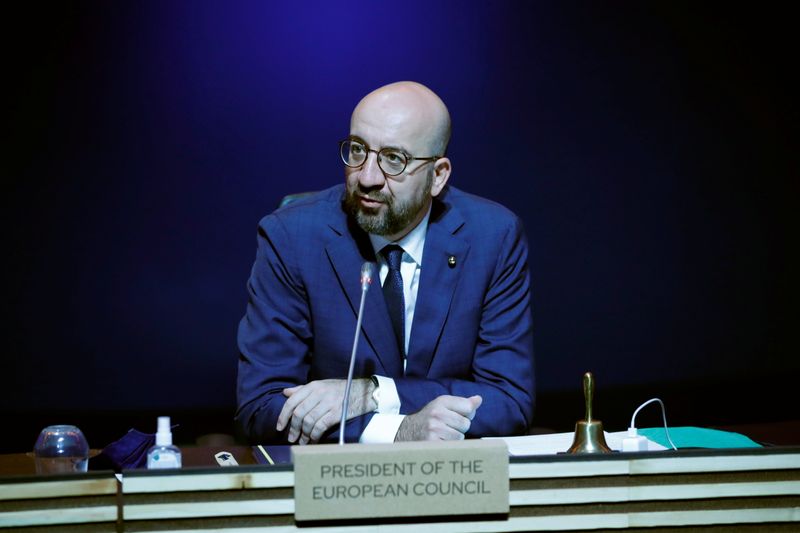PORTO, Portugal (Reuters) - The European Union is sceptical about the usefulness of waiving patent rights to COVID-19 vaccines as a way to fight the pandemic, but is ready to discuss a concrete proposal, the chairman of EU leaders Charles Michel said on Saturday.
Speaking to reporters before the second day of an EU summit in the Portuguese city of Porto, Michel said the way to fight the pandemic now was to quickly make more shots and lift export curbs on them in countries like the United States and Britain that make vaccines but do not sell them to others.
"In Europe we took the decision to make exports possible and we encourage all partners to facilitate the exports of doses," Michel said after discussions with leaders of the 27-nation bloc on Friday evening.
India and South Africa called last year for the lifting of patent rights to vaccines as a way of boosting manufacturing and ensuring the world is supplied. Debate around the issue erupted anew on Wednesday when U.S. President Joe Biden supported the idea, provided it was done through the World Trade Organization.
The time taken to get a WTO agreement and to build expanded vaccine-making capacity would mean that such a waiver would not provide a quick fix, sceptics say.
"On intellectual property -- we don't think that in the short term that it is a magic bullet, but we are ready to engage on this topic as soon as a concrete proposal would be put on the table," Michel said.
Officials said that during Friday's summit talks, Germany - home to BionTech which holds a patent on the highly effective mRNA vaccine together with Pfizer (NYSE:PFE) - argued strongly against the idea of waiving patent rights.
Portugal, Estonia, Belgium and Ireland were also sceptical but Greece backed the waiver idea, as did Italy, which was in favour of time-limited and geographically targeted measures.
EU officials say Europe is one of the biggest exporters of coronavirus vaccines in the world, with some 200 million doses shipped out to 90 countries -- the same number of shots that Europe has distributed among its own citizens.
French President Emmanuel Macron, speaking to reporters before Saturday's talks, said that with COVID-19 vaccines the world could try to emulate what was done years ago with medicines against HIV, when such medicines became too expensive for poor nations.
"We need to start a debate today about doing exactly as we did at the time of HIV, where the intellectual property was a source of blockage, it should be possible to lift it, but in a limited way," Macron said.
He stressed that any action should not financially punish the companies that came up with the vaccine technology.

The EU's executive arm, the European Commission, called on Friday on the United States and other major vaccine producers to export what they make. Commission head Ursula von der Leyen told a news conference discussions on the waiver would not produce a single dose of COVID-19 vaccine in the short- to medium-term.